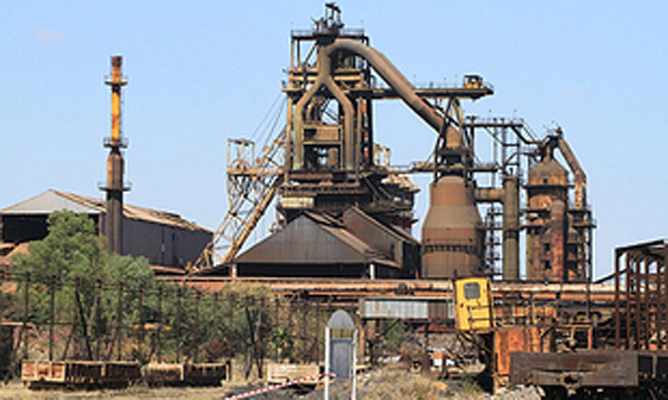
Ziscosteel has been unlucky in love: Twice its relationship with Indian firms failed to materialise.
BY NDAMU SANDU
Ziscosteel has been unlucky in love: Twice its relationship with Indian firms failed to materialise.
The first Indian suitor turned out to be a fly-by-night.
The second showed so much love, but Zisco’s parents were demanding heaven on earth and the suitor walked away.
Last week, the government announced a new suitor for Zisco: Chinese firm, R & F, so deep-pocketed that they would inject $2 billion into the ailing steel giant.
The investor, with interests in property and hotels, is touted to revive the steel giant and return life to Redcliff, which had slowly turned into a ghost town.
The revival of Zisco will trigger growth in companies such as Hwange Colliery Company Limited (HCCL), National Railways of Zimbabwe and other suppliers.
- Chamisa under fire over US$120K donation
- Mavhunga puts DeMbare into Chibuku quarterfinals
- Pension funds bet on Cabora Bassa oilfields
- Councils defy govt fire tender directive
Keep Reading
HCCL managing director, Thomas Makore said they were looking forward to Zisco’s revival since it is one of the largest off-takers of coal.
“At its peak, we used to supply them with 100 000 tonnes per month. It’s significant for us. We will have a large off-taker of our coking coal, which is of high value. It improves on our portfolio of customers and profitability position,” he said.
Benedict Moyo, chairman of the management workers’ committee, told NewsDay the transaction would be an early Christmas present to the people of Redcliff and Kwekwe.
“This time, we are hoping that it will happen. People are looking forward to it. We are not worried about who comes in. We are worried about our families. Redcliff is now a ghost town,” he said.
“If somebody can come and revive the giant, we will appreciate it and hope it [the transaction] will not be disturbed by anything.”
The euphoria has not been the same as the one experienced when Essar Africa Holdings announced that it would take over the moribund parastatal in 2011 in a deal worth $750 million.
The investment was billed to create at least 3 500 jobs. The nation was told to expect the refurbishment of the plant to deliver a production capacity of 0,5 million tonnes per annum in 12 to 18 months.
The Indian investor showed commitment by paying workers’ salaries, while discussions were underway for the transfer of the ore to the new company.
It never happened as the transaction became the first casualty of the infighting in the then inclusive government.
Essar would eventually walk away from the marriage, leaving behind confused in-laws counting the losses of their stubbornness.
In 2006, a new suitor for Zisco was unveiled: Indian firm Global Steel Holdings Limited (GSHL), which was billed to inject $400m in a rehabilitate, operate and transfer arrangement.
The deal gave GSHL management control of the company. Lalit Seghal assumed the reins, sending Gabriel Masanga packing after over a decade at the helm of the parastatal.
The “behemoth” would inject money into Zisco in tranches within 18 months, it was said.
It later emerged that Zimbabwe had been sold a dummy. An investigation by the parliamentary portfolio committee on Foreign Affairs, Industry and International Trade unearthed shocking details on the lop-sided transaction.
The committee blasted authorities for sleeping on the wheel after failing to do proper due diligence on the Indian firm.
“GSHL is reported to be facing a lawsuit for improper conduct in Texas, the United States, for receiving the concession to run Nigeria’s Ajaoukuta Steel Company Limited, with allegations of corruption and bribery cited,” the committee said.
GSHL was chosen on the basis that its contract with a Nigerian company had resulted in output rising from zero to two million tonnes of hot metal in two years, a strong balance sheet with an asset base of $8bn, the holistic nature of investment in upgrading the related support infrastructure and the investment capacity to add value to Ziscosteel’s products.
The committee report showed that GSHL had devised a mechanism to fleece the parastatal’s money after telling Knight Frank, property managers of Pearl House, to increase rentals and backdate the increases. Ziscosteel’s Harare offices were at Pearl House.
“If the increase had been entertained by the finance division, Ziscosteel would have been prejudiced of Z$433 373,” the committee said.
It said that GSHL had informed a South African supplier of graphite electrodes, Ucar, to increase the price to R31 450,50 from R26 560 a tonne.
The committee said: “This would have also resulted in a prejudice to Ziscosteel of R58 686 for 12 tonnes on order.” Analysts say this was the last chance to revive Zisco.
“If they miss this, that’s the end. No sane investor would want a project that would have been rejected by two credible suitors,” an economist with a leading commercial bank said.
Industry and Commerce portfolio committee chairman, Edmond Mhere told NewsDay on Tuesday that Zisco had found a genuine investor.
“We feel the revival of Zisco will result in the revival of the industry,” he said.
Mhere said the transaction culminated from intense discussions and due diligence.
Asked whether the deal would not flop like the previous transactions, he said the new investor would concentrate on steel production, unlike its predecessor who wanted to also venture into mining.











